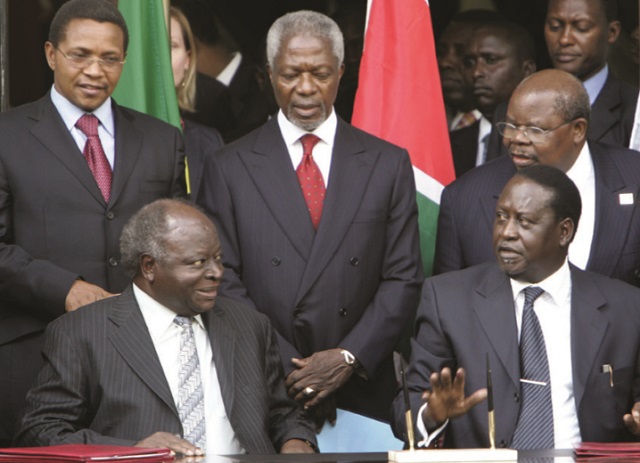
ANALYSIS | BAKER BATTE | The former President of Kenya, the late Emilio Stanley Mwai Kibaki will be remembered for the election violence that gripped Kenya in 2007/8 following an acrimonious election.
Kibaki who died on Friday was announced as the winner of the hotly contested election having defeated his political nemesis Raila Odinga of the Orange Democratic Movement. On December 30, 2007, the Kenya Electoral Commission chairman Samuel Kivuitu declared Kibaki as the winner of the election beating Odinga with just 230,000 votes.
Less than three hours after he had been declared winner, Kibaki was stealthily sworn in at State House Nairobi to serve another five years as the third President of Kenya, a country with the largest economy in the East African region.
What followed this disputed election was electoral violence never seen before in the history of Kenya. This violence, by official account, left 1300 people dead while 350,000 others were uprooted from their homes.
Now as Kenya gears towards another election in which Odinga is making a fourth attempt at the presidency, Uganda which depends on Kenya for most of its supplies is on tenterhooks. The memories of 2007 when the prices of fuel and other essential commodities went through the roof; are still fresh. Back in 2007, to solve the impasse, the international community had to get involved. Former United Nations Secretary-General, the late Kofi Anan mediated the talks between Kibaki and Odinga to find a political solution.
In the end, Kibaki retained the presidency but allowed some of his powers to be shared by the Prime Minister, a creation of the political discussion. The position went to Odinga who was also allowed to appoint a number of Cabinet ministers in the government of national unity. This Kenyan approach was to be repeated in Zimbabwe where the then President Robert Mugabe after an acrimonious election agreed to share power with his political rival Morgan Tsvangirai.
The same also happened in South Sudan between President Salva Kiir and his erstwhile vice president Riek Machar. However, despite of the 2007 debacle, Kibaki is credited for transforming Kenya into what it has become today; a regional economic force to reckon with.
When Kibaki became president in 2002, after 24 years of Daniel Arap Moi dictatorship that not only affected the politics but also the economy, being the economist that he was, implemented frugal policies that saw a rebound in the economy. Official figures show that the Kenyan Gross Domestic Product-GDP an economic measure of the country’s wealth, grew from a mere 0.6% during most of the Moi period to 3% in 2003, then to 4.9% in 2004, then to 5.8% in 2005 then to 6% in 2006 and 7% in 2007.
This trajectory would have continued were it not for the devastating 2007/8 election violence and the global financial nosedive. The growth was reversed to 2.6% in 2009 but by the time he left power in 2013, the economy had picked up growing at an annual rate of 5%.
Kibaki was born on 15 November 1931 to Kibaki Githinji and Teresia Wanjiku. He attended local schools for primary and for secondary he went to Mang’u High School before joining Makerere University where he is said to have obtained a First-Class honors Bachelor of Arts degree in economics in 1955. He was later to join the London School of Economics where he also got another Bachelor’s degree in Science in Economics.
After completing his studies, he returned to Makerere as a lecturer until 1960 when he was poached by leaders of KANU to become their Executive Secretary and hence marking his long stay in Kenyan politics.
In 1963, Kibaki contested and won the position of Member of Parliament representing Donholm constituency. After 10 years, in 1974, he shifted to Othaya constituency, his home in Nyeri County, which he represented until 2013 when he left competitive politics.
In Kenyan politics, a presidential candidate also had to have a constituency that he represents.
Other than being MP, Kibaki also served in different cabinet ministerial positions include; Finance, Commerce, and Industry. He was also Moi’s Vice President for 10 years between 1978 and 1988. He was to later move out of KANU and founded his own political party; the Democratic Party which became the official opposition after the 1992 election.
In 2002 after Moi agreed to retire as President, Kibaki was selected as the joint candidate of the coalition that had been formed to take on KANU’s preferred candidate; now current President Uhuru Kenyatta. He comfortably won the election and hence became the third President of Kenya others being Arap Moi and Jomo Kenyatta.
A date for his burial has not been set yet however President Uhuru Kenyatta said he will be accorded a state funeral and until this happens, all flags in Kenya are to fly at half-mast.
Kibaki’s death comes just two years after the death of his predecessor Arap Moi in 2020. He is survived by four children; Judy Wanjiku, Jimmy Kibaki, David Kagai, and Tony Githinji. His wife Lucy Kibaki with whom he had been in marriage for more than 50 years passed on in 2016.
*****
URN
 The Independent Uganda: You get the Truth we Pay the Price
The Independent Uganda: You get the Truth we Pay the Price




Rest in peace H.E Kibaki. My condolences to the Kenyans for losing such a resource. May the Almighty God grant him a peaceful rest.